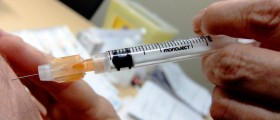
The Papanicolau test, also known as the Pap smear, Pap test, cervical smear, or smear test, is a screening test used to detect premalignant or malignant changes in the ectocervix. This method is used in prevention of cervical cancer, as it may detect the earliest signs of cervical cancer and actually save patients life. Early diagnosis of cervical cancer is essential to prevention and increasing the patient’s survival chances. Cervix is the lower part of the uterus that opens into the vagina. Pap smear screens for any infection, abnormal cells or cervical cancer in this area.
Pap test
Papanicolau test should be a part of health care routine for all women older than 21. Women should continue regular testing trough out their whole reproductive life, in the menopause, and bring to a close when they become older than 65. Frequency of regular Pap smears depends on the patient and patients health history. Women older than 21, should have Pap test every two years. Women older than 30, that had three normal Pap tests for 3 years in a row should consult a doctor about spacing out Pap tests to every three years. Women with compromised immune system, such as women with HIV infections, are at a higher risk of developing cervical cancers. These women should get two Pap tests within a year and if both tests come out normal, they can continue having yearly tests in the future.
HPV virus
HPV or human papilloma virus is one of the most commonly sexually transmitted diseases. This virus is a major cause of cervical cancer. Human papilloma virus is, actually, a group of more than hundred different viruses of which around 40 percents spreads during the sexual intercourse. Most of the HPV viruses are harmful and asymptomatic for humans, but some of them are serious health concern. It is estimated that approximately 20 million Americans are currently infected with HPV. About 1% of sexually active adults in the United States have genital warts and around 12.000 women each year gets cervical cancer.
Prevention
HPV infection is noticeable only if it causes genital warts in patients, but normally, the infection goes unnoticed. Cervical cancers, cancers of the anus, and genital cancers, all associated with HPV infection; show no obvious symptoms in the early stages of the disease. Most of the people never know they are infected and the virus stays hidden in the body gradually developing into the serious health problem. Pap smear is the easiest and safe way to detect the presence of the virus, respond appropriately, and save the life.






_f_280x120.jpg)










Your thoughts on this
Loading...